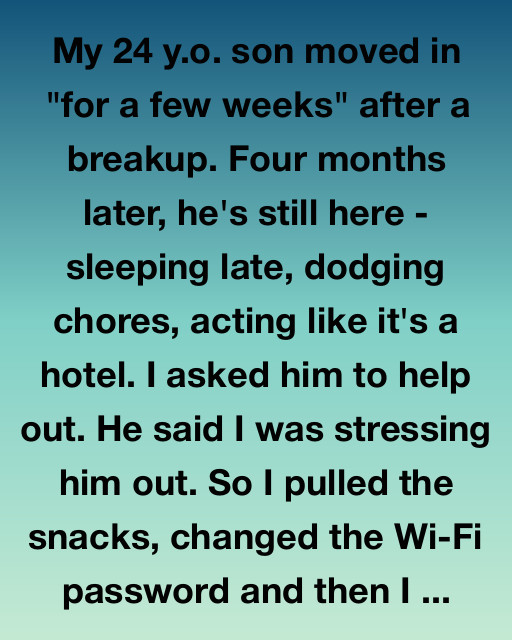I changed the Wi-Fi password, hid the snacks, grabbed an overnight bag, and walked out without saying where I was going.
Miriam’s text came back in under a minute: “Guest room’s yours.” I slept at her place that night, not because I wanted drama, but because I was tired—tired of repeating myself, tired of stepping over dishes, tired of feeling like a concierge in my own home. My son is twenty-four. He moved in “for a few weeks” after the breakup. Four months later, he was still sleeping late, dodging chores, and calling my requests “stress.”
He didn’t text that first night. The second evening: “Where are you?”
“With a friend,” I wrote. “Needed a break.”
“Ok,” he replied.
“Ok.” The word stung more than I expected.
Miriam poured coffee in her sunlit kitchen and shrugged in that useful way she has. “He’s not fourteen. One weekend without room service won’t kill him.” I laughed, but my chest hurt anyway. The question I didn’t speak out loud kept tapping: Did I raise him wrong? Too soft, too hard, too… something?
Before heading home I sent a message: “Back tomorrow. Please tidy up. I don’t want to walk into a mess.” No reply.
The smell hit me first—burnt something. The trash overflowed, plates fossilized with ketchup ringed the table, and one of my plants was slumped in a corner like it had given up. He was asleep.
When he finally shuffled downstairs, hoodie half on and hair in a half-hearted argument with gravity, I asked if he had anything to say. He frowned. “Like what?”
“Maybe ‘sorry’? For ignoring me. For the house.”
He rolled his eyes. “I didn’t think it was that serious.”
Something in me went quiet—and solid. “You have one week to figure out your next step,” I said evenly. “Job, place to live, both. This isn’t working.”
“You’re kicking me out?”
“I’m reminding you you’re a guest,” I said. “Guests don’t stay forever.”
He stomped off. I made tea and sat with the ache of it. That night I cried the quiet kind of tears—the kind that wash questions but don’t carry answers: where did I misstep, how do you love a grown child without carrying them?
In the morning I woke to clumsy sounds in the kitchen. He was frying eggs, badly. “Morning,” he muttered. Then, without looking up: “I applied to three jobs yesterday.”
I didn’t expect much; I’d heard versions before. But a small gear shifted. Over the next few days he got up before noon. He vacuumed once—one room, but still—and left a note on the fridge: “Out at an interview.” He came home in my ex’s old blazer and said it went okay. He even smiled. First one in weeks.
The twist didn’t arrive with a job offer. It arrived in a shoebox.
I was in the attic hunting for fall decorations when I found letters tucked inside an old box—his handwriting, his name on the envelopes, some addressed to his ex, some to himself, one to “the version of me I hope to be someday.” I didn’t read them all. I read enough to stop breathing right: “I feel like I’m floating, untethered. Everyone expects me to bounce back, but I’m still bleeding inside.”
I sat on the attic floor with paper ghosts in my lap and let a different kind of tears come. Not angry this time—tender and terrified at once.
That night I made his favorite pasta. Halfway through dinner I said, “I found your letters.”
His fork paused midair.
“They were in an old box,” I added. “I wasn’t snooping.”
He stared at his plate. “I didn’t want you to know.”
“Why?”
“Because you’d fix it,” he said softly. “Like always. And I didn’t want to be fixed. I wanted to figure it out. I just… didn’t know how. So I shut down.”
The truth slid between us and settled. I reached across the table. “I love you. But loving you doesn’t mean carrying you.”
“I know,” he said. “I think I’m starting to.”
The next morning he made me coffee. It was too strong and weirdly heroic, but it was a gesture. A week later he got an offer—sales associate at a tech store. Not glamorous, but honest. He came home grinning. “I start Monday.” Then, a beat later: “I’m looking at apartments.”
Three weeks after that, we loaded boxes into a borrowed truck. He hugged me longer than usual at the door. “Thanks for the kick in the butt,” he said. “And… everything else.”
After he left, the house was quiet again, but the quiet felt like space instead of emptiness—room for air, room for growth. A month later he invited me over. The apartment was tiny and proud. He’d framed one of the letters and hung it by the door:
“To the version of me I hope to be someday — you’re doing okay. Keep going.”
In the corner he’d written, “Getting closer.”
Driving home, I thought about how parenting doesn’t end at eighteen; it evolves. You stop holding their hand and start holding space. Sometimes love looks like stew and soft landings. Sometimes it looks like changing the Wi-Fi password, removing the snacks, and leaving—so they can choose to come back to themselves.
Letting go, just enough, was the hardest part. It was also the most loving.


